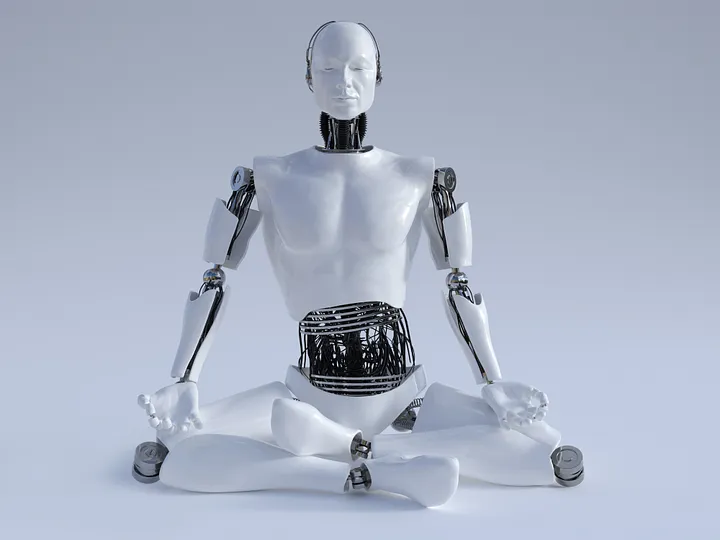Here is a short story that tells you that AI will never take place of human intelligent. Shortly after the launch of Google Chatbot, I relieved all of writers since I can get what the offer with just a click and prompting. But weeks later, I had need for them again. I discovered that the AI cannot provide all the content we needed for the blog, especially current or recent event. Read also: Popular and Best Tourist Destinations around the World – Paris

AI Will Not Replace Humans in the Near Future – 10 Reasons
First and foremost, AI lacks the emotional intelligence of a human being. Sure, we can program machines to recognize and respond to certain emotions, but can they truly empathize with us? Can they console us when we’re feeling down or make us laugh when we’re feeling blue? I don’t think so.
For example, imagine you’re having a terrible day at work. Your boss has been riding you all day, and you just spilled coffee all over your new shirt. If you were to turn to an AI for emotional support, what would it say? “I’m sorry to hear that, would you like me to order you a new shirt?” That’s just not going to cut it. We need real, human connections to get us through tough times.
Secondly, AI lacks creativity. Sure, we can train machines to paint pictures or compose music, but can they truly create something new and original on their own? I don’t think so.
For example, let’s say you asked an AI to come up with a new recipe for a pizza topping. It might come up with something like “pepperoni and pineapple,” which sounds fine, but it’s hardly groundbreaking. A human, on the other hand, might come up with something truly unique and delicious, like a pizza topped with mac and cheese or even sushi!
Lastly, AI lacks the ability to think outside the box. Sure, we can program machines to solve complex problems and even beat us at games like chess and Go, but can they truly think creatively and come up with innovative solutions? I don’t think so.
For example, let’s say you asked an AI to come up with a solution to a traffic jam. It might suggest adding more lanes to the highway or rerouting drivers to side streets. But a human might come up with a truly innovative solution, like building a system of underground tunnels or even flying cars!
While AI has its uses and can be incredibly helpful in many areas, it will never truly replace humans. We possess a unique combination of emotional intelligence, creativity, and out-of-the-box thinking that no machine can ever replicate. So rest easy, fellow humans – we’re here to stay!
AI Versus Human Intelligent
Artificial Intelligence (AI) and Human Intelligence are both forms of intelligence that are capable of solving problems, making decisions and processing information. However, they differ in several ways. Here are some examples of how AI and human intelligence differ:
- Creativity: AI can be trained to perform certain tasks, but it cannot generate creative ideas on its own. Humans, on the other hand, can use their imagination and creativity to come up with new ideas, innovate and create something from scratch. For example, an AI algorithm may be able to paint a picture based on an input image, but it cannot create an original piece of art from scratch.
- Emotional Intelligence: Humans have a level of emotional intelligence that AI currently lacks. Humans can understand and empathize with other people’s emotions, while AI can only recognize and respond to pre-defined emotional cues. For example, AI can recognize when someone is smiling, but it cannot understand why they are smiling.
- Adaptability: Humans are more adaptable than AI. Humans can learn and adapt to new situations and environments, while AI needs to be programmed or reprogrammed to handle new tasks or situations. For example, if a factory changes its manufacturing process, human workers can adapt and learn new skills, but the AI machines need to be reprogrammed to work with the new process.
- Morality and Ethics: Humans are capable of making ethical and moral decisions based on their own values and beliefs. AI, on the other hand, cannot make moral or ethical decisions on its own. For example, humans can decide whether it is right or wrong to lie in certain situations, while an AI algorithm cannot make such a decision.
- Communication: Humans are capable of communicating in a much more complex way than AI. Humans can understand idioms, sarcasm, and context. AI, on the other hand, can only respond based on what it has been programmed to recognize. For example, an AI chatbot may be able to respond to simple queries, but it cannot understand the nuances of human conversation.
- Decision Making: AI is capable of making decisions based on data and algorithms. However, humans are able to make decisions based on intuition, experience, and critical thinking. For example, an AI algorithm may be able to predict the stock market trends based on data, but a human investor may make a decision based on their intuition and experience.
Finally, AI and human intelligence are both important forms of intelligence, but they differ in several ways. While AI can perform tasks more efficiently, it lacks the creativity, emotional intelligence, adaptability, morality and ethics, communication, and decision-making abilities of human intelligence. Therefore, we need to recognize the strengths and limitations of each type of intelligence, and use them in tandem to create a better world.
10 Reasons why AI will not replace humans
Ok. get this straight. This reply is coming AI expert. “As an AI expert with over 10 years of experience, I can say with confidence that AI will not replace humans. While machines can certainly perform many tasks more efficiently than we can, they lack the unique qualities that make us human”.
Here are 10 reasons why AI will never be able to replace us:
- Empathy and Emotional Intelligence – Machines cannot empathize with humans. They cannot understand or feel the same range of emotions that we do. They cannot comfort us when we are feeling down or celebrate with us when we achieve something great.
- Creativity – Machines can only do what they are programmed to do. They cannot come up with new ideas or think outside the box. Humans have the ability to create art, music, literature, and much more.
- Flexibility – Humans are capable of adapting to new situations and environments. Machines are limited by their programming and cannot easily adjust to changes.
- Intuition – Humans have the ability to make decisions based on their intuition and experience. Machines can only make decisions based on the data they have been given.
- Personal Touch – In fields such as healthcare, humans provide a personal touch that machines cannot replicate. Patients feel more comfortable talking to a human doctor or nurse than they would talking to a machine.
- Social Interaction – Humans need social interaction to thrive. Machines cannot provide the same level of social interaction that humans can.
- Ethics and Morality – Machines cannot make moral or ethical decisions on their own. Humans have the ability to reason and make decisions based on their moral compass.
- Adaptability – Humans are capable of learning and adapting to new situations. Machines cannot do this without being reprogrammed.
- Empowerment – AI can be used to empower humans by making tasks easier or more efficient. For example, an AI-powered tool can help a writer find synonyms for a word, but the writer is still the one who creates the content.
- Love – Humans are capable of experiencing and expressing love. Machines cannot.
In conclusion, AI will never be able to replace humans because we possess qualities that machines do not. We should embrace AI as a tool to help us achieve our goals, but we must remember that we are the ones in control. AI should be used to empower us, not replace us. As we continue to advance technologically, we must remember to value the unique qualities that make us human.



